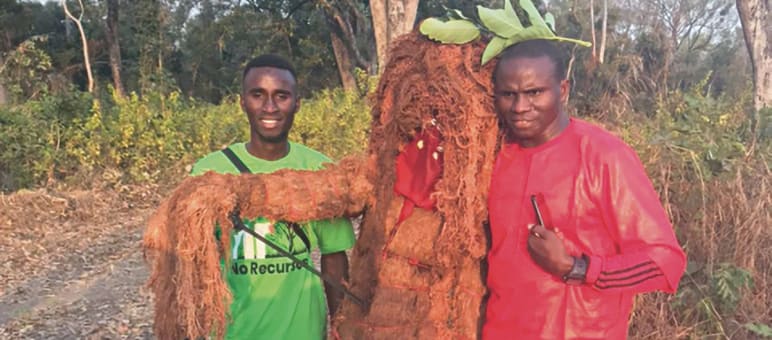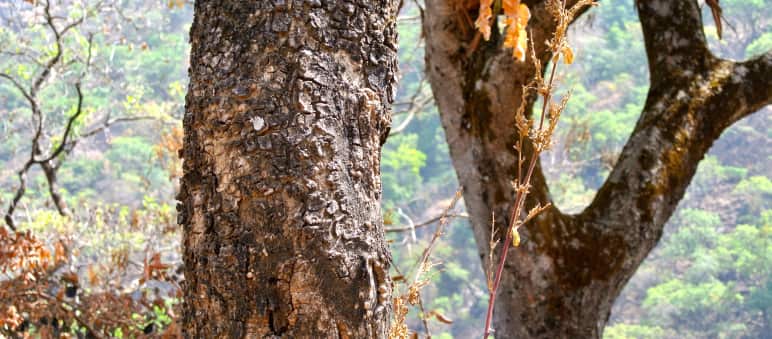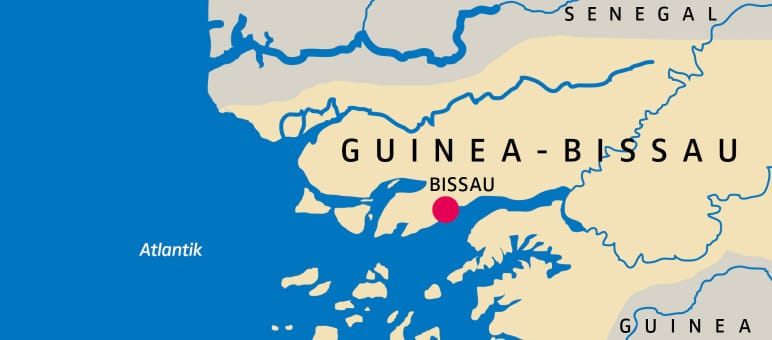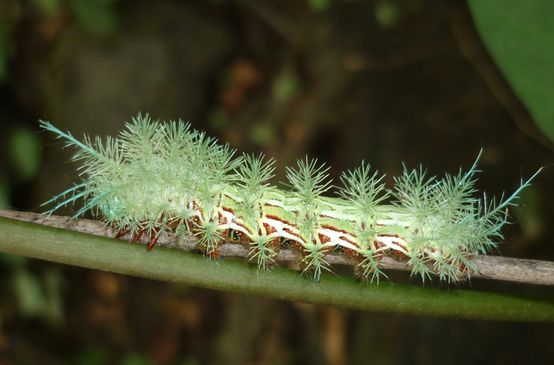Protecting the forest with ancient rites and a radio program
What happens when a traditional Mandinka king launches a radio program? Villagers become investigators, calling in to expose illegal logging operations. Lamin Seidi Cani weaves spirituality with modern activism – where ancient rites protect trees and airwaves empower communities to defend Guinea-Bissau’s forests against corruption and exploitation.
Project Overview
Project FocusRainforest Defenders
Project Objective a radio program to uncover environmental crimes
Activities reporting for a radio program
Clad in a costume of bark, the forest spirit Kankoran Fambondi strides through the village of Simboree, a machete in each hand. His appearance and movements are “very scary”, says Lamin Seidi Cani – yet it’s for a good cause. The bark of the young fara tree serves to protect nature – when the Kankoran Fambondi wraps a strip of it around a tree trunk, it serves as a protective shield, signaling that this tree must not be injured or felled.
Lamin Seidi Cani respects the authority of the forest spirit. The founder of our partner organization Our Resources is at home in the mystical world of the Mandinka, one of the ethnic groups in Guinea-Bissau. He was recently crowned a traditional king: His skills and knowledge were tested by elders, including those in neighboring countries, in an elaborate ceremony. “Spirituality knows no national borders,” he explains.
Ancient rites and animism are deeply rooted
Traditional beliefs and animism are firmly rooted in everyday life and are so diverse that it’s not easy to follow Lamin’s explanations. But he knows that spirituality alone will not save nature, especially when loggers and corrupt officials do not share the faith but see the forests simply as a resource to be plundered. The activist therefore relies on the power of information, and his radio program “Tchintchor na Ronda” plays a key role in this.
Listeners call in to report environmental crimes such as loggers felling rosewood and other trees without a permit. And they intervene when criminal offenses need to be solved or thwarted. Lamin therefore hopes that the idea for his program will catch on. “Whether in Senegal, the Gambia or Guinea, I tell people about it everywhere – and many wish there was something comparable in their country.”
Land rights for the Indigenous population
Rural, often Indigenous people are the key to protecting the forests, and they are most effective wherever such communities have formal land rights. Lamin is thus working to ensure that areas around the villages are surveyed and entered in the land register. Once such land rights have been established, the permission of the elders is required before trees can be felled, firewood collected, or the land used for hunting.
Lamin also wants to make agriculture more diverse: Villagers abandoned their rice fields a few years ago because imported rice was cheaper. Now that the price has risen, cultivation would be necessary for food security, but the fields have become unusable. Because restoring the land is time-consuming, small farmers tend to plant new fields – and clear forest to do so. Our Resources is therefore helping local people make their abandoned land arable again. The organization has invested in an old tractor to do so. Beyond rice for self-sufficiency, orchards and vegetable gardens will provide people with an income.
Spirituality and the modern world go hand in hand
Talking to Lamin leaves no doubt about how closely rainforest protection is linked to the needs of local communities, to securing their food and agriculture, and how global forces play a role – for example, in the market for rice or the overexploitation of rosewood.
The effort to preserve nature in Guinea-Bissau must therefore not only be anchored in reality, but also borne by spirituality.
Our Resources has been a Rainforest Rescue partner since early 2020. The starting point of our collaboration was our shared concern over the felling of rosewood trees, and it has grown from there. “Rainforest Rescue has done more to protect our forests than the United Nations,” says Lamin Seidi Cani with a laugh – but he means it.
The name of the radio program “Tchintchor na Ronda” refers to the title of a song by Guinea-Bissau singer Dulce Neves. The tchintchor is a bird whose song announces rain.



